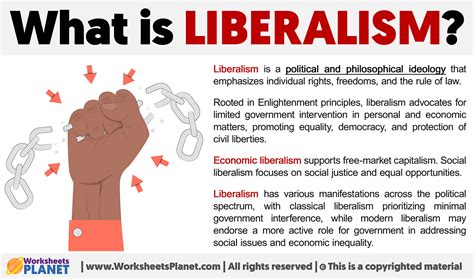Introduction

In the realm of American politics, the term “liberal” holds significant importance. It encapsulates a distinct set of beliefs and values that shape the perspectives and policies of those who identify as liberals. To fully grasp the nuances of liberal ideology, it is crucial to delve into its core principles and examine how they translate into concrete political actions.
Defining Liberalism
The term “liberal” traces its roots back to the Latin word “liber,” meaning “free.” In the context of political thought, liberalism emerged as a philosophy that emphasizes individual liberty, equality, and the protection of human rights. Liberals believe that governments should play an active role in promoting these ideals and ensuring social and economic justice for all.
Core Principles of Liberalism
At the heart of liberalism lies a fundamental belief in the inherent dignity and worth of every individual. Liberals advocate for:
- Individual Liberty: The freedom to make personal choices, pursue happiness, and express one’s beliefs without undue interference from the government.
- Equality: The conviction that all individuals should have equal opportunities and access to resources, regardless of race, gender, sexual orientation, or socio-economic status.
- Human Rights: The recognition of fundamental rights and freedoms that cannot be abridged by governments, including the rights to life, liberty, and security.
- Government Intervention: The belief that government intervention is necessary to address societal inequalities, protect vulnerable populations, and promote the general welfare.
Liberal Policies and Priorities
Liberal principles translate into a range of specific policy positions. Liberals typically support:
- Social Welfare Programs: Policies and programs that provide assistance to individuals and families in need, such as healthcare, education, and childcare subsidies.
- Civil Rights Protections: Laws and regulations that safeguard the rights of minorities, women, and LGBTQ+ individuals from discrimination and injustice.
- Environmental Conservation: Policies aimed at protecting the environment and mitigating the effects of climate change.
- Gun Control: Measures designed to reduce gun violence and ensure public safety.
- Fair Taxation: Progressive tax policies that require individuals with higher incomes to pay a larger share of taxes.
Liberal Ideologies: A Spectrum of Beliefs
Within the broader liberal camp, there is a spectrum of ideologies that vary in their emphasis on different principles. Some key ideological divisions include:
- Classical Liberalism: Emphasizes individual liberty, limited government intervention, and free market principles.
- Social Liberalism: Focuses on social justice, equality, and government programs to address societal inequalities.
- Modern Liberalism: A synthesis of classical and social liberalism, combining a commitment to individual liberty with a belief in the role of government in promoting social progress.
The Importance of Liberalism in American Politics
Liberal perspectives have had a profound impact on American political history and continue to influence debates on a wide range of issues. Liberal politicians, activists, and intellectuals have played a pivotal role in advancing progressive reforms, expanding civil rights, and strengthening social safety nets.
Challenges and Criticisms
While liberalism enjoys widespread support, it also faces challenges and criticisms. Some common critiques include:
- Government Overreach: Concerns that government intervention can stifle individual liberty and create dependence on government programs.
- Economic Inequality: Arguments that liberal policies exacerbate economic inequality by reducing incentives for personal responsibility and encouraging dependency.
- Social Engineering: Accusations that liberal policies prioritize social justice over individual rights and promote a “nanny state” mentality.
Conclusion
The definition of liberal AP gov encompasses a complex array of beliefs and values that prioritize individual liberty, equality, and government intervention to promote social and economic justice. Understanding the tenets of liberal ideology is essential for navigating the political landscape and engaging in informed discussions about key societal issues. By embracing the principles of liberalism, we can strive to build a more just, equitable, and sustainable society for all.
In-Depth Analysis
Economic Policies
Liberals believe that government has a responsibility to intervene in the economy to address market failures and promote economic justice. They support policies such as:
- Minimum Wage: Establishing a minimum hourly wage to ensure that workers earn a living wage.
- Social Security: Providing retirement and disability benefits to workers who have paid into the program throughout their careers.
- Affordable Care Act: Expanding access to health insurance and providing financial assistance to low-income individuals.
- Progressive Taxation: Implementing a tax system that requires higher-income earners to pay a larger share of taxes, while providing tax breaks to low- and middle-income families.
Social Policies
Liberals advocate for policies that promote social justice and equality. These policies include:
- Civil Rights Laws: Protecting individuals from discrimination based on race, gender, sexual orientation, and other characteristics.
- Equal Pay for Equal Work: Ensuring that women and men receive equal pay for performing the same jobs.
- Paid Family Leave: Providing workers with paid time off to care for newborn children or ill family members.
- LGBTQ+ Rights: Expanding legal protections and recognition for LGBTQ+ individuals.
Environmental Policies
Liberals recognize the importance of protecting the environment and mitigating the effects of climate change. They support policies such as:
- Renewable Energy: Investing in renewable energy sources, such as solar and wind power, to reduce greenhouse gas emissions.
- Carbon Pricing: Implementing a tax on carbon emissions to encourage businesses and individuals to reduce their carbon footprint.
- Land Conservation: Protecting natural habitats and biodiversity by setting aside public lands and conservation easements.
- Environmental Justice: Addressing the disproportionate environmental impacts experienced by low-income communities and communities of color.
Foreign Policy
Liberals typically favor a multilateral approach to foreign policy, emphasizing diplomacy, international cooperation, and the promotion of human rights. They support:
- Diplomacy and Negotiation: Using negotiations and diplomatic channels to resolve conflicts and advance multilateral agreements.
- International Law: Promoting the rule of law and respect for international treaties and conventions.
- Human Rights: Supporting international efforts to protect human rights and prevent human rights violations.
- Foreign Aid: Providing financial and technical assistance to developing countries to support economic growth and social development.
